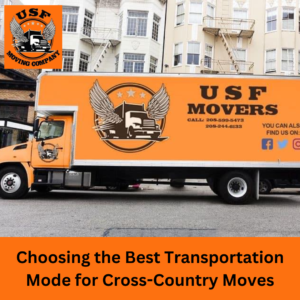If you’re getting ready for a move, you might be wondering how to find the right local movers for the job. 3 Qualities to Look for in Local Movers ,According to RubyHome, in the United States, there are an estimated 7,000 moving companies in operation. With so many available options, it can be helpful to have a few tips to narrow down the candidates. Be sure to look for these qualities when you’re choosing the company to handle your move.
3 Qualities to Look for in Local Movers Before You Hire
If you’re getting ready for a move, you might be wondering how to find the right local movers for the job. According to RubyHome, in the United States, there are an estimated 7,000 moving companies in operation. With so many available options, it can be helpful to have a few tips to narrow down the candidates. Be sure to look for these qualities when you’re choosing the company to handle your move.
While the sheer volume of moving companies might seem overwhelming, selecting a trusted partner becomes simple once you understand the benchmarks of excellence. The most reliable and efficient firms distinguish themselves not just by low rates, but by their commitment to safety, service, and modern standards. To streamline your selection process, we have broken down the 3 Qualities to Look for in Local Movers into core pillars of trust, professional skill, and digital efficiency, ensuring your valuable possessions are handled by a reputable crew with nothing less than full transparency and expertise.
1: Unwavering Transparency and Legal Compliance (The Trust Foundation)
In the digital age, trust is built on verifiable proof. A reputable local mover must provide full transparency regarding their legitimacy and pricing.
- Licensing and Insurance: A non-negotiable must-have. Look for verifiable proof of federal and state licensing (e.g., USDOT Number for movers crossing state lines, even if local operations are intrastate). They must carry Liability Insurance and offer Valuation Coverage options that clearly define their responsibility for your items.
- Transparent Pricing & Estimates: The mover should offer a clear breakdown of costs, including fuel surcharges, staircase fees, or shuttle fees before the move begins. They should offer binding estimates to guarantee the final price, minimizing the risk of hostage loads or sudden, large charges.
- Clear Contracts: The contract (Bill of Lading) must explicitly state all services, pricing models, inventory, and cancellation policies.
2: Proven Expertise and Specialized Skill (The Professional Edge)
Expertise goes beyond just lifting boxes; it involves technical skill, proper training, and the right equipment.
- Specialized Handling Experience: Does the crew have specific training for high-value, fragile, or complex items like pianos, antique furniture, fine art, or pool tables? Ask about their approach to disassembly and reassembly of complex items (e.g., fitness equipment).
- Proper Equipment and Vehicle Maintenance: The movers should arrive with a well-maintained fleet and high-quality packing materials (e.g., blanket-wrapping techniques, specialized dollies, floor runners, and door jamb protectors). A professional company invests in protecting both your items and your property.
- Professional Crew: The staff should be full-time, background-checked employees not temporary labor who wear company uniforms and demonstrate respect for your schedule and property.
3: Customer-Centric Technology and Communication (The Modern Service Factor)
Today’s best movers utilize technology to make the moving experience seamless and stress-free.
- Responsive Communication: This includes quick response times and offering multiple communication channels (email, phone, text, chat). The ability to confirm details and address concerns efficiently is paramount.
- Digital Tools: Look for movers offering virtual estimates (via video call), digital inventory tracking (using tablets or apps), and real-time GPS tracking of the moving truck, allowing you to monitor the location of your belongings on moving day.
- Reputation Management: They should have a strong, recent, and verifiable history of positive reviews across multiple platforms (Google, Yelp, BBB), and, importantly, they should show how they address negative feedback publicly and professionally.
Current Moving Aspects to Address
To make the content truly current and helpful, include these modern considerations:
- Virtual & Hybrid Estimates: Discuss the efficiency of getting a quote via video call (Zoom/FaceTime) rather than a traditional in-home visit, saving time for both parties.
- Liability and Coverage Options: Detail the two main types of valuation:
- Released Value Protection: Basic, minimum coverage (e.g., $0.60 per pound per item).
- Full Value Protection (FVP): The mover is liable for the replacement value of any damaged item. Emphasize that FVP is the standard of excellence.
- Inventory Management Systems: Explain how using a digital inventory system ensures every item is accounted for at both pickup and delivery, virtually eliminating the risk of lost items.
Conclusion
Choosing a local moving company isn’t just about finding the cheapest quote; it’s about investing in peace of mind. By focusing on the three essential qualities Transparency, Proven Expertise, and Customer-Centric Technology you move beyond simple reliability and select a modern partner truly equipped to handle your relocation.
At USF Moving Company, we pride ourselves on embodying these qualities, from our guaranteed binding estimates and specialized crew training to our seamless use of digital inventory and tracking systems. We understand that a local move is a significant life event. Don’t leave your belongings to chance.
People Also Ask
Q: Should I choose a binding or non-binding moving estimate?
A binding estimate is highly recommended. This guarantees the final cost won’t exceed the estimate, provided the inventory of items remains the same. Non-binding estimates are only approximations, and the final price can be higher.
Q: What documents should I ask to see before signing a contract?
Always ask for proof of USDOT authority, the Bill of Lading (your contract), and a pamphlet detailing the “Your Rights and Responsibilities When You Move” summary, which is legally required for interstate movers.
Q: How does real-time GPS tracking benefit my move?
GPS tracking (a modern feature) provides peace of mind by allowing you to monitor the truck’s location, confirm arrival times, and better plan your personal travel and availability on delivery day.
Q: Are virtual estimates as accurate as in-home estimates?
Yes, when done correctly. A professional mover will use the video call to thoroughly survey all storage areas (attics, garages, closets) and furniture, leading to an accurate cubic foot or weight assessment.
Q: How can I verify a moving company’s licensing and complaint history?
For interstate movers, use the Federal Motor Carrier Safety Administration (FMCSA) website. You can look up their USDOT number to check their insurance status and official complaint history.



